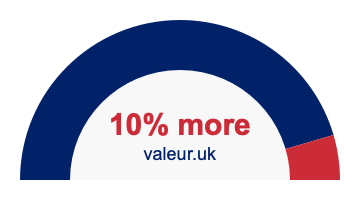
What is 10 percent more than 643? What is the formula used to calculate 10 percent more than 643? How can we calculate 10 percent more than 643?
Here we will show you the formula used to calculate 10 percent more than 643 (10% more than 643), and then we will calculate the answer to 10 percent more than 643 using our formula. We will also illustrate what 10 percent more than 643 looks like.
The formula used to calculate 10 percent more than 643, as well as other percent more than problems, can be seen below:
PM = ((P ÷ 100) × OV) + OV
PM (Percent More) is the answer we want, P (%) is the percent, and OV (Original Value) is the starting value. Therefore, when we substitute 10 for P and 643 for OV in our formula, we get the answer to 10 percent more than 643, as solved here:
PM = ((10 ÷ 100) × 643) + 643
PM = (0.1 × 643) + 643
PM = 64.3 + 643
PM = 707.3
10% more than 643 = 707.3
So, how does our formula work to calculate 10 percent more than 643? First, it takes 10 percent of 643, and then it adds that result to 643 to get our final answer. Below we have provided an illustration so you can better visualize 10 percent more than 643.

In our illustration above, the area shaded in blue is 643, and the area shaded in red is 10 percent of 643. Therefore, the blue area and the red area together represent 10 percent more than 643. In other words, blue is 643, red is 64.3, and blue plus red is 707.3.
Percent More Than Calculator
Please enter a similar problem in the box below and we will solve it for you:
What is 10 percent more than 644?
Here is a similar problem we have explained, calculated and illustrated for you.
